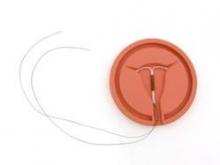Pediatricians should be aware of the most recent updates in contraception and considerations for special populations so they can appropriately counsel their adolescent patients, according to the new American Academy of Pediatrics policy statement on contraception for adolescents.
The statement, prepared by the AAP’s committee on adolescence, updates the one from 2007 with new contraceptive methods available to teens, revised recommendations regarding existing methods, and best practices in counseling teens on contraception (Pediatrics 2014 Sept. 29 [doi: 10.1542/peds.2014-2299]).
The most significant change in this policy statement is the recommendation for long-acting reversible contraceptive (LARC) methods, such as the implant and the intrauterine device (IUD), as first-line contraceptive choices for teens who choose not to remain abstinent.
“Adolescents are capable of understanding complex messages about sexual health,” said Dr. Mary Ott of the Indiana University department of pediatrics. “Adolescents trust pediatricians and understand that their pediatricians can simultaneously encourage abstinence and provide nonjudgmental contraceptive information and care,” said Dr. Ott, the study’s lead author.
Two other important points to emphasize in this updated statement are the special attention that should be paid to the sexual and contraceptive needs of obese, developmentally disabled, and medically complex adolescents, and the fact that all hormonal methods of birth control are safer than pregnancy, Dr. Ott said in an interview.
The report emphasizes the importance of confidentiality, minor consent for contraception, and an “honest, caring, nonjudgmental attitude and a comfortable, matter-of-fact approach to asking questions” when it comes to teens’ sexual health needs.
HIPAA allows parents access to their children’s records, but some states have laws affording greater confidentiality to minors that overrides that access, and parents can opt to allow their children confidential care.
Because lower contraceptive use and higher teen pregnancy rates are associated with limitations on confidentiality and consent, the AAP recommends confidentiality regarding teens’ sexuality and sexually transmitted infections (STIs). It also urges doctors to have an office policy that involves explaining and discussing confidentiality practices and options with patients and their parents.
Effective counseling starts with taking a sexual history with the five Ps, according to the AAP: “partners, prevention of pregnancy, protection from STIs, sexual practices, and past history of STIs and pregnancy.” From there, doctors should employ motivational interviewing, focusing on teens’ future goals and ways of incorporating healthy behaviors into their lives.
The report notes that approximately 80% of the 750,000 teen pregnancies each year are unplanned, and almost half of all U.S. high school students have reported having had intercourse at least once. Yet the most effective contraceptive methods – primarily hormonal ones – are the least utilized by teen girls.
Although abstinence is the only 100% effective way to avoid unplanned pregnancy, “pediatricians should not rely on abstinence counseling alone but should additionally provide access to comprehensive sexual health information to all adolescents,” the report states. Sexually active teens, or those considering sexual activity, should receive counseling on all safe and appropriate contraception options for their needs, on the methods’ risks and effectiveness, and on STI screening.
When advising teens on specific contraception methods, pediatricians should rely on efficacy rates based on typical use rather than perfect use. The most effective methods are those that require the least adherence of patients, such as progestin implants and IUDs.
After these recommended first-line contraceptive choices, Depo Provera injections and the contraceptive patch are very effective and safer than pregnancy. However, pediatricians should still recommend condom use with all sexual intercourse to protect against STIs.
Teens do not need a pelvic exam prior to receiving a contraception prescription or IUD placement referral, the statement recommends, and STI screenings can occur the same day as a prescription or IUD placement.
The report addressed contraception and sexual health counseling for special populations, including obese teens and the 16%-25% of teens with a physical or developmental disability or a complex illness – such as chronic disease or HIV – and organ transplant recipients.
Despite being historically overlooked, teens in these populations have sexual needs and outcomes similar to those of typical teens, the statement notes, but they have additional needs as well. “Issues that arise include safety concerns with estrogen use, medication interactions, and complications from the underlying disease,” the statement notes.
Those taking medications that can cause birth defects may need contraception, and others may need hormonal birth control to help suppress menstruation if they have heavy menstrual bleeding or a bleeding disorder or are undergoing chemotherapy. The report recommends that pediatricians consult the CDC’s online “U.S. Medical Eligibility Criteria for Contraceptive Use” and have a working knowledge of various hormonal contraceptive methods because of their potential value for menstrual cycle control and management of conditions such as acne or dysmenorrhea.


